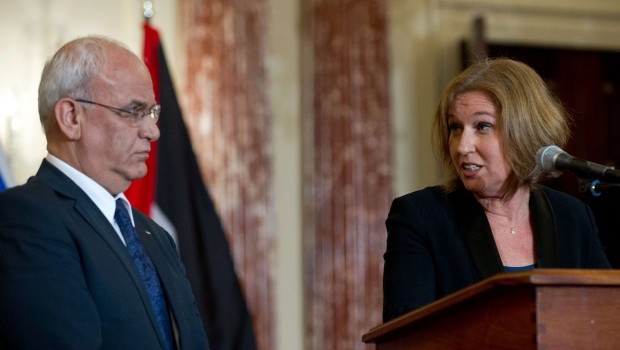
Israel’s chief negotiator and Justice Minister Tzipi Livni (R) turns to chief Palestinian negotiator Saeb Erakat (L) as she speaks to the press with US Secretary of State John Kerry at the State Department in Washington,DC on July 30, 2013.
The news was announced by US Secretary of State, John Kerry, following preliminary talks between the two sides in Washington DC on Monday and Tuesday.
Kerry, speaking at a press conference on Tuesday, said: “sustained, continuous, substantive negotiations on the core issues” would begin at a site in Israel or the Palestinian territories within the next two weeks.
He was joined by Tzipi Livni, Israel’s minister of justice, and Saeb Erekat, the chief Palestinian negotiator, who represented the two sides in this week’s talks.
Erekat said: “Palestinians have suffered enough… It is time for the Palestinians to live in peace, freedom and dignity within their own independent sovereign state.”
Livni told reporters that she was under no illusions that the negotiations would be easy, but that she hoped they “transform that spark of hope into something real and lasting.”
Kerry said: “I know the path is difficult. There is no shortage of passionate sceptics. But with capable, respected negotiators . . . I am convinced that we can get there.”
Despite the public optimism displayed by Kerry and the negotiators in Washington this week, serious obstacles remain to any final political settlement of the Israel-Palestine conflict.
In particular, previous talks in 2010 broke down over the issue of the construction of Israeli settlements in the West Bank, which was captured by Israel in the 1967 Arab-Israeli war, and is expected to form the nucleus of any future Palestinian state.
Both sides have said that any deal which involves territorial borders will be subject to referendums in both Israel and the Palestinian territories.
The two sides must also reach a settlement on the city of Jerusalem, which both states claim as their capital, and the “right of return” of Palestinians who were expelled or fled from territory now claimed by Israel in 1948.
